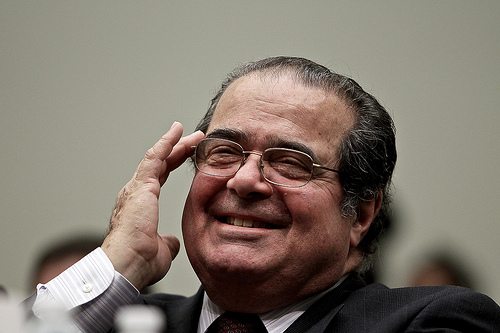Why Justice Scalia’s Ties To The Gay Conversion Therapy Movement Matter
Justice Scalia has close ties to groups that try to "pray away the gay." For one thing, his son is active in the "gay conversion" movement.

Much like crisis pregnancy centers, groups that promote “pray away the gay” therapies rely on equal parts psuedo-science and deep moral hostility for those “patients” they aim to treat. So it should concern us that, in a matter of months, when the Supreme Court hears arguments in two landmark cases that will define the extent to which our laws recognize, respect, and protect marriages one of the sitting justices who will hear those arguments has close ties to the conversion movement.
Justice Antonin Scalia’s son Paul, is a priest who works for the Catholic group Courage. Michael McGough reports for the LA Times that Paul Scalia has been actively involved in the gay conversion therapy movement for many years. In 2005 he published an article in the magazine First Things that criticized the Vatican for using the term “homosexual person” which, Paul Scalia argues “suggests that homosexual inclinations somehow determine, which is to say confine, a persons identity” to being gay. The problem, according to Paul Scalia and others who promote gay conversion therapy, isn’t that a person “is” gay, it’s that they act on homosexual inclinations. In other words, there are no gay people, only gay actions.
Now, it’s not like Justice Scalia’s vote is of any real question. No justice has been so vocally and virulently homophobic as Scalia. He famously compared gay sex to murder, polygamy and bestiality in his 1996 dissent in Romer v. Evans and in 2003 argued Texas should have free license to enforce a law based on moral disapproval of homosexual conduct, even in the face of constitutional protections of equal protection under the law. And when as recently as last week, when confronted by Duncan Hosie, a freshman at Princeton who had come to hear the Justice speak, Scalia doubled down.
“I think there is a fundamental difference between arguing the Constitution does not protect gay sex, which is a defensible and legitimate legal position I disagree with, and comparing gays to people who commit murder or engage in bestiality,” Hosie said. “Do you have any regret or shame for drawing these comparisons you did in your dissents?”
Scalia did not. “If we cannot have moral feelings against homosexuality, can we have it against murder? Can we have it against these other things?” he said to Hosie. “Of course we can. I don’t apologize for the things I raised. I’m not comparing homosexuality to murder. I’m comparing the principle that a society may not adopt moral sanctions, moral views, against certain conduct. I’m comparing that with respect to murder and that with respect to homosexuality.” He said that it was an argument by way of reduction to the absurd—and, since this is Scalia, he did so with a note of something between sarcasm, condescension, and stubbornness: “It’s a type of argument that I thought you would have known…. I’m surprised you aren’t persuaded.”
Scalia may be trying to parse his words precisely here, but he can’t escape his radical Catholicism and ties to a movement that at its heart denies the humanity of gay men and women.
It has what has so far separated him from Justice Anthony Kennedy, another conservative Catholic on the Court. In Lawerence v. Texas Kennedy wrote: “The case does involve two adults who, with full and mutual consent from each other, engaged in sexual practices common to a homosexual lifestyle. The petitioners are entitled to respect for their private lives. The state cannot demean their existence or control their destiny by making their private sexual conduct a crime.”
While hardly a groundbreaking embrace of homosexuality and plenty problematic in its own right, Kennedy’s opening shows the difference between the two justices and some indication of how the lines could be drawn in the DOMA and Prop 8 cases. Justice Kennedy may not approve of homosexuality, but he is willing to grant consenting couples their privacy rights. Justice Scalia, on the other hand, fundamentally refuses to recognize the humanity of the LGBT community, and seems confused as to why this is a problem.
